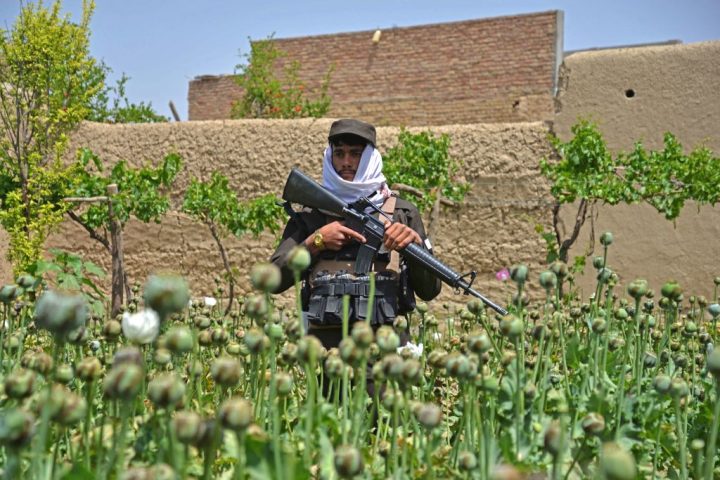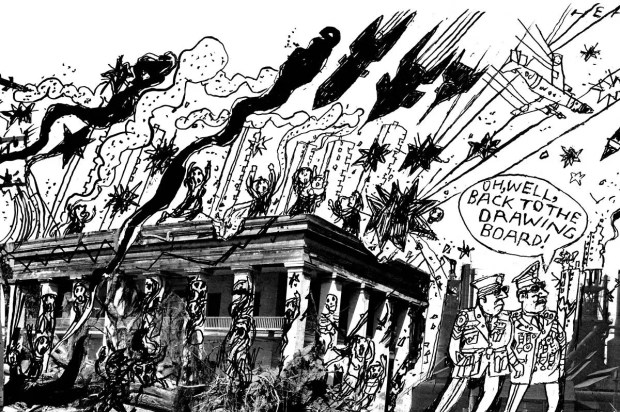The meth and heroin addicts were still gathering in their hundreds in a squalid encampment under the Pul-e-Sokhta bridge in the Afghan capital of Kabul. It was a sorry sight to see them squatting beside bonfires while stray dogs ran around them, barking. Many were homeless and had nowhere else to go.
‘It’s easier to access the substance here,’ a dealer and one of the bridge camp’s scruffy inhabitants told me. ‘Everything is available here, best quality. They (the police) come here but they don’t bother us a lot. We are friends with the dogs; when it’s cold the dogs sit next to us; they may get high when we smoke, too, but not directly.’
If Afghan poppy farmers are knocked out of the game, others will quickly fill their shoes
The man noted I don’t look like one of the bridge’s regulars. What am I doing here, he asked. Then he asked if I wanted to buy anything. A dose of morphine cost a hundred afghanis, or $1 (80p). Another man offered me a drag on his morphine-laced cigarette. Eventually, my translator and guide started to get nervous. ‘Let’s go,’ he said. ‘I don’t want any Taliban to see us here.’
When the Taliban swept back into power in 2021 after the American withdrawal, they promised to stamp out the illicit narcotics trade that began in the poppy fields and ended in the veins of junkies as far afield as Moscow, Manchester and Mombasa.
At the start of the decade, it was estimated that Afghanistan was the origin of 82 per cent of the world’s opium supply, which is then refined into heroin and morphine. At first, the Taliban went around rounding up drug addicts at gunpoint to be taken to forced, prison-like detox centres. But by the time I visited in November last year, they seemed to have given up: the addicts were back under the bridge, and the poppy farmers had just planted a new crop.
I was warned by my guide that Afghanistan’s new rulers were still serious about cleaning it up. He was right. Satellite images now show that opium cultivation has shrunk by 80 per cent in some parts of Afghanistan over the past year. Video clips shared online show tractors tearing up poppy fields. The trade in ephedra, a plant used to make crystal meth, is being shut down too.
They sure showed us up. In 2001, Tony Blair said stopping Afghan heroin from reaching British shores was one of the main reasons for sending in troops to oust the Taliban. The Taliban, it seems, achieved what two decades of our occupation could not. So, does this mean there’ll be less smack sold on the streets of Britain? Fewer deaths? Sadly, that’s not how narco-nomics works.
Targeting dealers alone won’t stop drug addicts from finding ways to access narcotics. You haven’t saved anyone from addiction or overdose because those who are desperate for their next fix are simply going to find someone else, and the opportunity is so profitable that they’ll never run out of possible pushers. It’s a simple case of supply and demand.
You might, temporarily, break up a drug ring, but that only makes matters worse: a recent study of policing in Indiana in the US has shown that when police make a major drug bust, the number of fatal overdoses may actually increase, as buyers seek out new sources of unknown strength and quality.
Imagine this drug crackdown playing out on a global scale. Poppies can grow anywhere. In fact, there’s nothing stopping you legally planting them in your garden, provided you don’t harvest their stupefying sap.
If Afghan poppy farmers are knocked out of the game, others will quickly fill their shoes. Afghanistan itself only became a heroin heartland after poppy fields were eradicated from Pakistan and the Middle East. This is what’s called the ‘balloon effect’: if you squeeze the drug trade in one place, it simply re-emerges somewhere else. In the 1980s, the chief heroin producer was Myanmar, where poppy plantations still flourish deep in the jungle.
While the UK suffers needless drug deaths, we can at least be grateful we’re not the States. Last year, more than 100,000 Americans died of a drug overdose – almost twice the number who died during the Vietnam war.
No-one can accuse America of being soft on drugs, yet the drug crisis keeps getting worse. This is the so-called ‘iron law of prohibition‘: the fiercer the war on drugs is fought, the stronger, and deadlier, the drugs become.
In 1870s America, fears that Chinese railroad workers were using it to seduce white women led to the first opium ban. This was the start of a pattern, where traffickers switched to ever-more potent products while lawmakers played catch-up, blaming whichever group the American public feared most at the time. In the 20th century, opium was replaced by heroin. President Richard Nixon’s response was to toughen the law further.
‘We knew we couldn’t make it illegal to be either against the (Vietnam) war or black, but by getting the public to associate the hippies with marijuana and blacks with heroin, and then criminalising both heavily, we could disrupt those communities,‘ Nixon advisor John Ehrlichman admitted. ‘Did we know we were lying about the drugs? Of course we did.‘
By the 2010s, traffickers began replacing heroin with synthetically-made fentanyl, fifty times stronger than heroin. Unsurprisingly, deaths shot out of control. More recently, yet another deadly drug cocktail known as ‘tranq dope’ is wreaking havoc on the streets.
From the drug cartels’ perspective, it’s better to discreetly cook fentanyl in a lab than fuss over brightly-coloured poppy fields catching the eye of the cops. It gets your customers higher, and, being more potent, you don’t need to sneak as much of it over the border.
Fentanyl has made inroads into Europe before. The last time the Taliban banned opium in the early 2000s, Russian-produced fentanyl flooded the neighbouring nation of Estonia. In Russia today, suffering from sanctions and home to a massive clandestine chemical industry, traffickers might be tempted to cash in on any heroin drought, possibly with the help of the security services. It wouldn’t be the first time the Kremlin has co-opted organised crime. Ironically, the Taliban’s crackdown on Afghan poppy farmers could soon come back to bite the West.
Got something to add? Join the discussion and comment below.
Get 10 issues for just $10
Subscribe to The Spectator Australia today for the next 10 magazine issues, plus full online access, for just $10.




















Comments
Don't miss out
Join the conversation with other Spectator Australia readers. Subscribe to leave a comment.
SUBSCRIBEAlready a subscriber? Log in